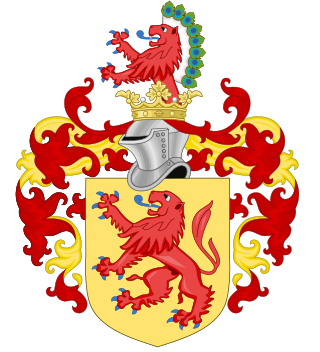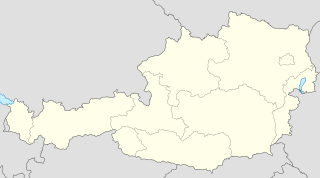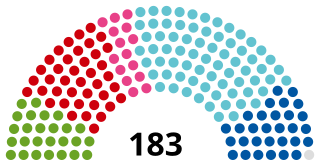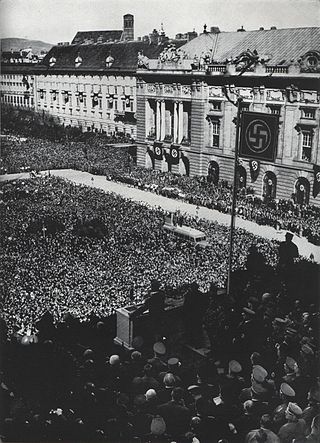See also
| Sovereign states |
|
|---|---|
| States with limited recognition | |
| Dependencies and other entities | |
Fauna of Austria may refer to:

Austria-Hungary, often referred to as the Austro-Hungarian Empire or the Dual Monarchy, was a multi-national constitutional monarchy in Central Europe between 1867 and 1918. Austria-Hungary was a military and diplomatic alliance of two sovereign states with a single monarch who was titled both emperor of Austria and King of Hungary. Austria-Hungary constituted the last phase in the constitutional evolution of the Habsburg monarchy: it was formed with the Austro-Hungarian Compromise of 1867 in the aftermath of the Austro-Prussian War and was dissolved shortly after Hungary terminated the union with Austria on 31 October 1918.

The House of Habsburg, also known as the House of Austria, is one of the most prominent and important dynasties in European history.

Franz Joseph I or Francis Joseph I was Emperor of Austria, King of Hungary, and the ruler of the other states of the Habsburg monarchy from 2 December 1848 until his death in 1916. In the early part of his reign, his realms and territories were referred to as the Austrian Empire, but were reconstituted as the dual monarchy of the Austro-Hungarian Empire in 1867. From 1 May 1850 to 24 August 1866, he was also president of the German Confederation.

Vienna is the capital, most populous city, and one of nine federal states of Austria. It is Austria's primate city, with just over two million inhabitants. Its larger metropolitan area has a population of nearly 2.9 million, representing nearly one-third of the country's population. Vienna is the cultural, economic, and political center of the country, the fifth-largest city by population in the European Union, and the most-populous of the cities on the Danube river.

Austria is a federal republic consisting of nine federal states. The European Commission calls them provinces. Austrian federal states can pass laws that stay within the limits of the constitution, and each federal state has representatives in the main Austrian parliament.

The National Council is one of the two houses of the Austrian Parliament and is frequently referred to as the lower house. The constitution endows the National Council with far more power than the Federal Council.

The Austria national football team represents Austria in men's international football competitions, and is controlled by the Austrian Football Association, the governing body for football in Austria.

The Habsburg monarchy, also known as Habsburg Empire, or Habsburg Realm, was the collection of empires, kingdoms, duchies, counties and other polities that were ruled by the House of Habsburg. From the 18th century it is also referred to as the Danubian monarchy or the Austrian monarchy.
The Official Municipality Key, formerly also known as the Official Municipality Characteristic Number or Municipality Code Number, is a number sequence for the identification of politically independent municipalities or unincorporated areas. Other classifications for the identification of areas include postal codes, NUTS codes or FIPS codes.

The Bundesliga, also known as Admiral Bundesliga for sponsorship reasons, is the top level of the Austrian football league system. The competition decides the Austrian national football champions, as well the country's entrants for the various European cups run by UEFA.

Sportclub Austria Lustenau is a professional association football club based in the town of Lustenau, Vorarlberg, Austria, that competes in the Austrian Football Bundesliga, the top tier of the Austrian football league system. Founded in 1914, it is affiliated to the Vorarlberg Football Association. The team plays its home matches at Reichshofstadion, where it has been based since 1951. The club's history includes several cup finals, numerous promotions and relegations, and some spells of sustained success.
A list of the most notable films produced in the Cinema of Austria, ordered by year and split by decade of release.
Ö3 Austria Top 40 is the official Austrian singles chart, as well as the radio show which presents it, aired Tuesdays on Hitradio Ö3. The show presents the Austrian singles, ringtones and downloads chart. It premiered on 26 November 1968 as Disc Parade and was presented by Ernst Grissemann.

The Anschluss, also known as the Anschluß Österreichs, was the annexation of the Federal State of Austria into the German Reich on 13 March 1938.

Postal codes in Austria were introduced in 1966. known locally as 'Postleitzahlen' are a fundamental aspect of the nation's logistical infrastructure, providing a systematic means of organizing mail delivery and geographical categorization. The term 'Postleitzahlen' translates to 'postal codes' in English.

Austria, formally the Republic of Austria, is a landlocked country in Central Europe, lying in the Eastern Alps. It is a federation of nine federal states, one of which is the capital, Vienna, the most populous city and federal state. Austria is bordered by Germany to the northwest, the Czech Republic to the north, Slovakia to the northeast, Hungary to the east, Slovenia and Italy to the south, and Switzerland and Liechtenstein to the west. The country occupies an area of 83,879 km2 (32,386 sq mi) and has a population of around 9 million.

The Austrian Cup, known as UNIQA ÖFB Cup for sponsorship purposes, is an annual football competition held by the Austrian Football Association, the ÖFB. During the 2008–09 season, Austria Wien won the tournament for 27th time, a record. SK Puntigamer Sturm Graz are the current holders, winning the 2022-2023 tournament, their 6th overall.